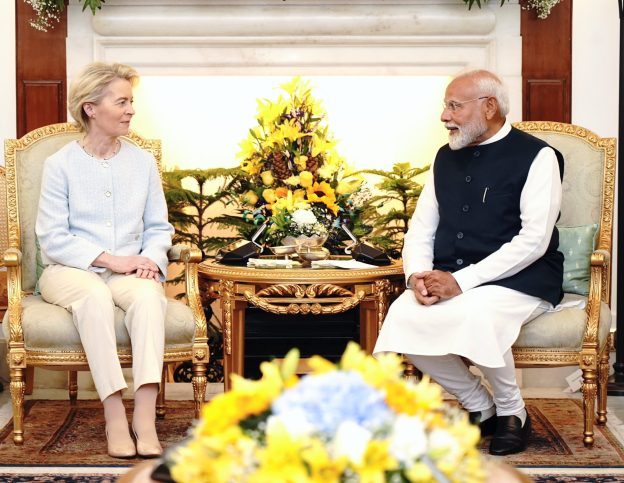Among the host of commitments that found their way into the Leaders’ Statement during the visit of European Commission President Ursula von der Leyen to India in February 2025 was the need for greater cooperation across a number of areas pertaining to climate change. Indian Prime Minister Narendra Modi and von der Leyen also reaffirmed their commitment to promote “a free, open, peaceful and prosperous Indo-Pacific,” in the wake of the European Union joining the Indo-Pacific Oceans Initiative (IPOI) in 2023. Within the IPOI, an Indian initiative, climate change has been a significant area of focus.
While the EU and India are working to address the challenges in their bilateral relations, including finalizing a much-delayed free trade agreement, climate cooperation in the Indo-Pacific can become a defining strategic initiative between the two. The prevailing heat waves in Europe and Indian cities, and its implications for livelihoods, economies, and conflict, make such cooperation even more necessary.
As global climate change increases the intensity and frequency of extreme weather incidents, the links between climate change and security have accrued considerable interest among researchers and policymakers in recent years. Yet much more needs to be done. The Indo-Pacific is one of the most exposed regions to natural hazards. Climate change is causing more frequent and intense typhoons and cyclones; exposure to sea-level rise in archipelagic countries, large coastal population centers, and small island states; and extreme heat events. As a result, estimates place 89 million people at risk of being displaced by the year 2050, according to the Global Report on Internal Displacement 2025. The Pacific Small Island Developing States (PSIDS), in particular, are facing the brunt of climate change, with some of the islands likely to become submerged or uninhabitable in the next few decades.
India and the EU established the EU-India Clean Energy and Climate Partnership (CECP) in 2016, which continues to form the basis of their climate change cooperation. Adopted six months after COP21 in Paris, the CECP focused on clean energy transition, climate adaptation, and mitigation to achieve common objectives related to the Paris Agreement. Climate change found prominent focus in the subsequent India-EU summits. During the 15th summit in 2020, India and the EU agreed on a “Roadmap to 2025” document, 20 paragraphs of which referred to either climate change, clean energy, or the environment. In 2024, the work plan for the 3rd Phase of the CECP, 2025-28, was adopted. Previously, in 2021, Indian and European officials convened a Climate Change Dialogue. There were ample indications that climate cooperation had become strategically important for both towards ensuring regional stability and global governance.
Also in 2021, the EU adopted its Strategy for Cooperation in the Indo-Pacific, identifying four key areas of cooperation: security and defense; trade and investment; climate action and environmental protection; and digital transformation and connectivity. This was reaffirmed at the first EU-Indo-Pacific Ministerial meeting, held in Brussels on May 13, 2023. India was among 21 Indo-Pacific partners that attended the meeting, and it welcomed the EU’s stake in Indo-Pacific developments, thereby reflecting a convergence of interests in making the Indo-Pacific stable and prosperous.
While India and the EU have a nearly decade-long history of commitment, doctrinal convergence, and frameworks of cooperation on climate change, it is time to extend their cooperation to the level of implementation in the Indo-Pacific. Studies have pointed out that in the absence of overarching regional institutional frameworks that bring together Brussels and New Delhi, building strategic partnerships could be a natural cooperation pathway for both. Cooperation on climate change in the Indo-Pacific can indeed be a core part of such a strategic partnership.
The case of PSIDS can serve as an example.
In the past few years, India has renewed its interest in the PSIDS, under its Act East policy, resulting in the setting up of the Forum for India-Pacific Island Cooperation (FIPIC). The PSIDS are acutely vulnerable to the impacts of global warming. Rising sea levels, extreme weather events, and the degradation of marine ecosystems pose existential threats to these nations. At the same time, they face myriad challenges in transitioning to renewable sources of energy. Tapping into this need, India has invested in solar power projects to power 2,800 homes in 14 island countries and in a $1.3 million project, through the India-U.N. Development Partnership Fund, to install solar power in the official residences of the heads of state of PSIDS. In addition, grants have been allocated to Kiribati and Vanuatu for providing solar energy equipment, while a concessional line of credit amounting to $150 million was set up in 2019 for climate action-based projects for the island states. Modi visited Fiji and Papua New Guinea in 2023. In 2024, India sent a ministerial-level delegation to attend the Pacific Islands Forum (PIF) Leaders’ Meeting with Dialogue Partners. India has been a PIF dialogue partner since 2002.
Notwithstanding its strategic interests and commitment to the region, a developing India’s contribution can remain only modest. However, it can be significantly enhanced with an EU partnership, resulting in the infusion of technology and resources. There is a need for a roadmap and a framework for cooperation, the groundwork for which may already have been initiated by India’s projects. Such cooperation can fulfil larger goals as well, beyond the traditional security objectives. A stronger EU-India partnership on technology transfer, climate finance, green energy transition, and sustainability can help bridge the North-South divide, achieving the objective of waging a unified fight against a growing concern of climate change that has implications for India, EU, and the Indo-Pacific and beyond.
Author
-

Dr. Shanthie Mariet D’Souza is an expert in international relations with over two decades of experience in academia, policy, and field research across Asia, North America, Europe, and Australia. She is the founder of the Mantraya Institute for Strategic Studies and a Senior Research Fellow at the University of Massachusetts Amherst. Her work spans counterterrorism, peacebuilding, security, and India’s foreign policy, with deep field experience in Afghanistan and South Asia. A prolific author and speaker, she has advised governments and international organizations and contributes regularly to global forums and leading publications on security and geopolitical affairs.



